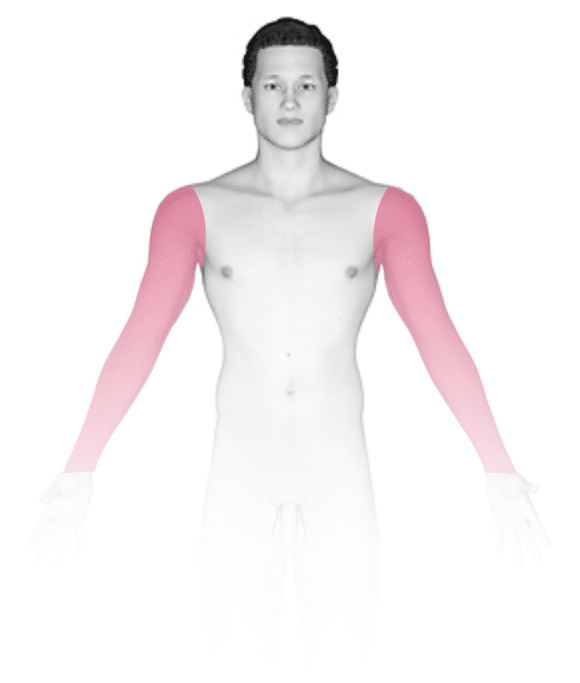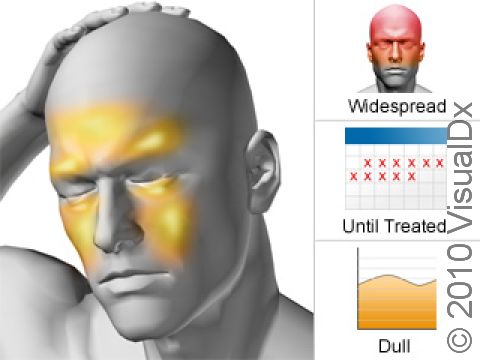Sinus Headache
Sinus headache involves head pain in the setting of irritation of the sinuses (air-filled chambers present in several bones of the face). This irritation can be secondary to infection of the sinuses by viruses, bacteria, fungi, or other organisms or may be secondary to allergies.
Immediately seek medical attention if you or someone you are caring for experiences any of the following:
- Stiff neck and a high fever associated with headache
- Sudden onset of a severe headache
- Loss of motor function, the ability to think clearly, or convulsions associated with headache
- Head injury
- Increased intensity and/or frequency of headaches
Who's At Risk?
Sinus headaches are a common response to allergies to substances in the environment such as dust, pollen, ragweed, and grass, which, in those affected by the particular allergy, cause production of secretions that drain into the sinuses and congest them. People with chronic or severe allergies may develop headaches in specific settings that they can easily identify (eg, seasonal allergies, being around pets).
Infection of the sinuses is possible in anyone, but it is potentially more common or serious in people who have weakened or malfunctioning immune systems (those with AIDS, cancer, or poorly controlled blood sugar; with chronic steroid use; old age, etc). Certain conditions may also make a person prone to sinus infections (eg, those with Sjögren’s syndrome), due to abnormal tissue lining of the sinuses. Injury to nasal passages and sinuses may also predispose a person to sinus infections and headaches.
Signs & Symptoms
Sinus headaches involve pressure or pain in the forehead, brow, below or behind the eye, behind the ear, and, occasionally, sensitivity in the upper gums. This pain is typically constant and on one side, but it may be on both sides of the head. Congestion with difficulty breathing through the nose may be present, due to secretions that can be thick and yellow or green in color. Blowing of the nose, moving quickly, lying down, and bending forward often intensify the pain. The area around the eyes and cheek may be swollen, to the extent that the eye may appear narrowed on the affected side when open. The forehead, brow, and cheek may be tender to the touch. Cough, runny nose, and itchy eyes and ears (if due to allergies) are additional possible symptoms.
If a fever is present along with sinus headache, then infection is more likely, but many sinus infections causing headache do not involve a fever. Sore throat, muscle aches, and fatigue may be present if the sinus infection is caused by a virus.
Self-Care Guidelines
Humidified air from a humidifier, basin of hot water, or shower can relieve symptoms, as can over-the-counter pain medications such as ibuprofen or acetaminophen. Over-the-counter decongestant sprays (oxymetazoline, phenylephrine) and tablets (pseudoephedrine) are often helpful. If allergies are responsible for the sinus headache, antihistamines (diphenhydramine, loratadine) or saline nasal sprays are effective and available at pharmacies.
Avoiding the causes of allergies or treating the allergic problem before exposure is also important. Avoiding flying or sudden changes in air pressure when having a sinus headache is helpful as well.
Treatments
If appropriate, your doctor may prescribe over-the-counter medications described above. Decongestants can be particularly helpful in sinus headache.
For more difficult allergies, medications that decrease secretion formation may be prescribed. Steroid nasal sprays can also be used effectively. For severe allergies, your doctor may refer you to an allergy specialist for other desensitizing therapies.
Your doctor may order a CT or MRI scan of the sinuses to determine the extent of a bacterial infection, if present. If your doctor suspects a bacterial infection, he/she may prescribe antibiotics. Many sinus infections are caused by viruses that the body can effectively eliminate with time, which do not require antibiotics. Different agents designed to kill fungus or other organisms may be prescribed depending on your medical history. Additionally, some of the fluids draining from you sinus may be taken to identify the infection.
Other headache syndromes, such as migraine or cluster headache, can mimic sinus headache. Your doctor will discuss these possibilities and advise you accordingly.
Visit Urgency
For people with known allergic triggers to sinus headaches, management is often possible without routine medical care simply by relieving symptoms with over-the-counter medications and, when possible, avoiding what causes the allergies.
Call your doctor if:
- You have head pain over your sinus and develop a fever, or you have a problem with your immune system.
- You symptoms are worsening in ways not experienced before.
- You develop new symptoms not typical of prior headache.
- A particularly severe headache occurs.
- Alteration or loss of consciousness occurs.
- Headache persists longer than 5–6 days, particularly with symptoms that are worsening.
- Current therapies/treatments are not working.
- Fever and neck pain or stiffness are present.
- Headache symptoms interfere with activities of daily living (eating, bathing, working, etc).
- You suspect an infection.
Last modified on October 6th, 2022 at 3:05 pm

Not sure what to look for?
Try our new Rash and Skin Condition Finder
